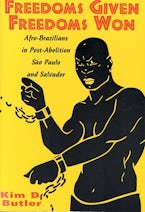"Freedoms Given, Freedoms Won . . . is essential reading for an understanding of Brazilian race relations and the black movement today. A particular virtue of the book, besides the enlightening comparative perspective itself, and the author's carefully and modestly argued analysis, is that the latter is firmly rooted in a combination of extensive first-hand interviews with survivors of the period examined, and consultation of contemporary public archives and the black press."
(Journal of Latin American Studies) "Butler does an excellent hob establishing the patterns of political behavior of people of colour in two of the most important politics of late 19th and early 20th century Brazil. Juxtaposing the two cities proves to be both illuminating and instructive."
(British Bulletin of Publications) "This book offers a clear comparative analysis of the post-abolition Afro-Brazilian community in two cities. Furthermore, among the book's many strengths is that it moves beyond a simple comparison of two populations. Butler successfully analyses her subjects within the much more broader context of the African diaspora throughout the Americas. . . . The book offers rare insight into the struggle for self-determination among a population that has traditionally lacked a historic voice."
(Law and History Review) "Kim Butler . . . proposes a theoretical framework to explain why African descendants in [Sao Paulo and Salvador] adopted different strategies of self-representations and suggests how this framework might contribute to the comparative study of the politics of freedpeople in the Afro-Atlantic diaspora. The result is an important contribution to the historiography of race and politics in Brazil that raises intriguing questions for scholars of postemancipation societies."
(H-Net Reviews) "Freedoms Given, Freedoms Won . . . is essential reading for an understanding of Brazilian race relations and the black movement today. A particular virtue of the book, besides the enlightening comparative perspective itself, and the author's carefully and modestly argued analysis, is that the latter is firmly rooted in a combination of extensive first-hand interviews with survivors of the period examined, and consultation of contemporary public archives and the black press."
(Journal of Latin American Studies) "Butler does an excellent hob establishing the patterns of political behavior of people of colour in two of the most important politics of late 19th and early 20th century Brazil. Juxtaposing the two cities proves to be both illuminating and instructive."
(British Bulletin of Publications) "This book offers a clear comparative analysis of the post-abolition Afro-Brazilian community in two cities. Furthermore, among the book's many strengths is that it moves beyond a simple comparison of two populations. Butler successfully analyses her subjects within the much more broader context of the African diaspora throughout the Americas. . . . The book offers rare insight into the struggle for self-determination among a population that has traditionally lacked a historic voice."
(Law and History Review) "Kim Butler . . . proposes a theoretical framework to explain why African descendants in [Sao Paulo and Salvador] adopted different strategies of self-representations and suggests how this framework might contribute to the comparative study of the politics of freedpeople in the Afro-Atlantic diaspora. The result is an important contribution to the historiography of race and politics in Brazil that raises intriguing questions for scholars of postemancipation societies."
(H-Net Reviews)

